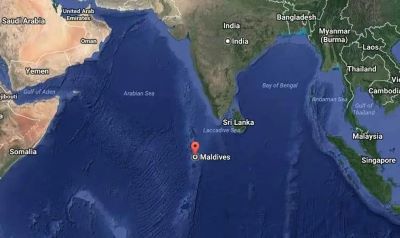Context:
The Maldives, a stunning island nation in the Indian Ocean, is facing a turbulent period marked by strained relations with India and a controversial embrace of China.The recently-elected President, Dr. Mohamed Muizzu, rode to power on an "India Out" plank, leading to a rift that resulted in Indian citizens boycotting travel to the Maldives. This economic nationalism, fueled by political rhetoric and racist remarks, has set the stage for a significant shift in the nation's dynamics. In the short term, the Maldives may witness a decline in Indian tourists, but the void is expected to be filled by an influx of Chinese visitors.
Economic Ramifications:
The Maldivian economy, heavily reliant on tourism, is at risk as the exit of Indian tourists may leave a lasting impact. With a quarter of its GDP coming from tourism, the sudden decline in Indian visitors could bruise the economy. In 2023, over 200,000 Indians visited the Maldives, making India a crucial contributor to its tourism industry. The short-term consequences may be significant, affecting the livelihoods of those dependent on the tourism sector. While the Maldives may not face a collapse akin to the 2020 "Made in China" COVID-19 crisis, the
economic repercussions are undeniable. The nation is set to navigate a storm in the high seas, seeking a new equilibrium as it grapples with the aftermath of geopolitical posturing.
The broader economic narrative for India, however, remains focused on growth, job creation, and market reforms. The Maldives issue is likely to fade from the headlines, becoming a mere footnote in India's domestic priorities. As the country gears up for a crucial general election, its attention will shift towards enhancing economic growth, investing in rising stock markets, and cultural development. The Maldives, once a significant player in India's diplomatic and economic landscape, may find itself relegated to the periphery as India steers its course toward internal imperatives.
Religious Fanaticism:
A pressing concern for the Maldives is the intertwining of religious fanaticism with its political landscape. The nation has seen a per capita contribution to the Islamic State, making it a noteworthy concern for regional stability. Between 2014 and 2018, Maldives provided a disproportionate number of individuals to the Islamic State, highlighting a potential breeding ground for extremism. The current administration's political posturing, including the "India Out" campaign, raises questions about its commitment to curbing religious extremism. The risk of terrorism exports from the Maldives becomes a tangible threat as diplomatic ties strain and preventive measures are discarded.
The implications of religious extremism extend beyond geopolitics, affecting the tourism sector. Acts of terrorism, from explosions to the vandalization of cultural sites, pose a threat to the Maldives' image as a peaceful tourist destination. The international community, including countries like the United Kingdom, Germany, Italy, the United States, and France, may reconsider their travel preferences, opting for safer alternatives in the region. The Maldivian leadership's need to dismantle terror supply chains and counter religious extremism becomes imperative to safeguard the nation's economic interests and global standing.
Strategic Blunder with China:
President Muizzu's strategic pivot towards China, as evident in his electoral campaign and subsequent foreign policy, is a second critical factor shaping the Maldives' destiny. By aligning with China and embracing an "India Out" stance, the Maldives risks becoming a pawn in a larger geopolitical game. The economic consequences of this alignment are not to be underestimated, as nations like Sri Lanka grapple with the repercussions of China's debt-driven diplomacy. The danger of bankruptcy looms as the Maldives becomes entangled in opaque financial conditions and potential coercive measures by its newfound ally.
China's role as a strategic player seeking to encircle India is a cause for concern, and President Muizzu's willingness to align with Beijing may compromise the Maldives' autonomy. The experience of other nations, such as Sri Lanka, underscores the risks associated with indebting oneself to China. As the Maldives takes on the mantle of a valued ally for China, it must tread carefully to avoid economic pitfalls that could leave the nation vulnerable to external influence and control.
Conclusion:
In navigating the complex interplay of economic nationalism, religious extremism, and strategic alignment with China, the Maldives stands at a crossroads. The decision to distance itself from India and embrace China may have immediate consequences on tourism and long-term repercussions on economic stability. The intertwining of religious fanaticism with political posturing adds another layer of complexity, risking the nation's image as a peaceful tourist destination.
President Muizzu's diplomatic choices and the Maldives' political trajectory may lead to an isolation that threatens not only economic prosperity but also geopolitical relevance. As India continues to prioritize internal development and economic growth, the Maldives may find itself grappling with the fallout of its decisions. The international community, including India, must closely monitor the evolving situation, extending support where needed, while recognizing the autonomy of nations to make sovereign choices. In the grand theater of geopolitics, small nations like the Maldives can quickly transition from being pawns to casualties, and the price of strategic miscalculations can be severe. The future of India-Maldives relations hinges on how President Muizzu navigates the intricate geopolitical waters and whether the Maldives can find a balance between its immediate interests and long-term stability.
|
Probable Questions for UPSC Mains Exam
|
Source – Indian Express







